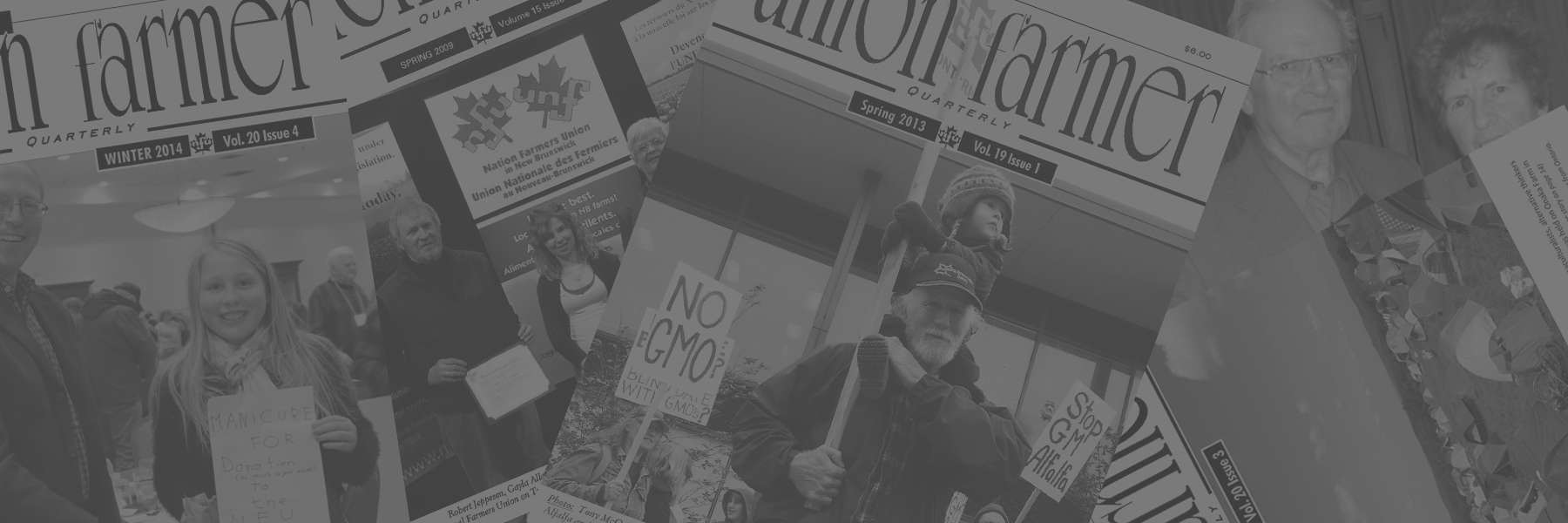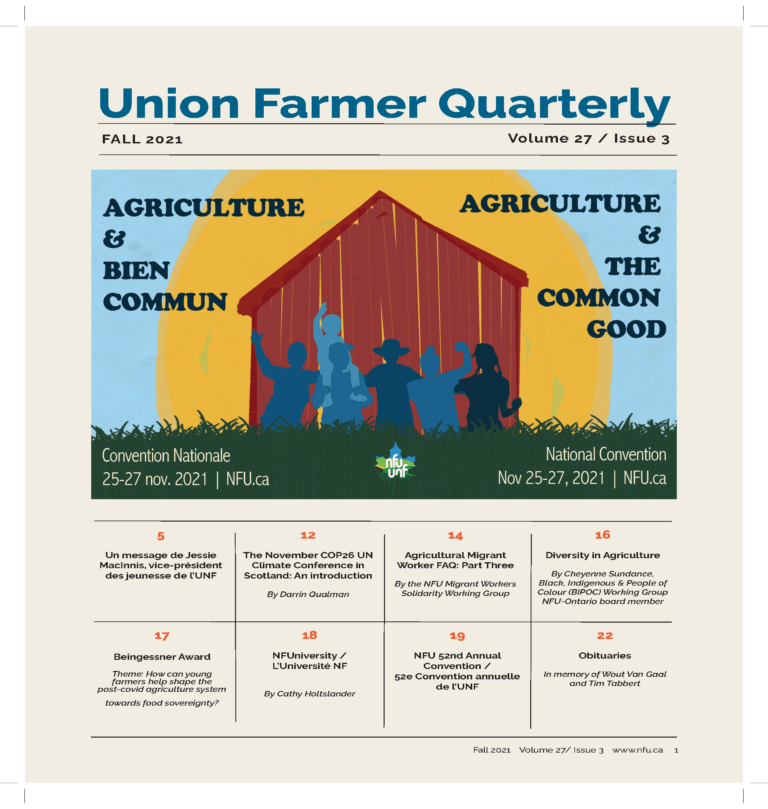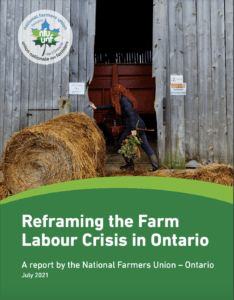In this Issue of Quarterly:
- A Message from Editorial Advisory Committee, Ann Slater
- A Message from NFU President, Katie Ward
- Un Message de l’UNF présidente
- A Message from NFU Women’s President, Bess Vanzandwyk
- Un Message de l’UNF présidente des femmes
- A Message from NFU Youth Vice President, Jessie MacInnis
- Un message de l’UNF vice-président des jeunesse
- A Message from Region 1 district 2, Suzanne Fournier
- A Message from Region 3, Don Ciparis
- A Message from Region 5, Anastasia Fyk
- A Message from Region 6, Dixie Green
- A Message from Region 7, Doug Scott
- A Message from Region 8, Seann Dory
- The November COP26 UN Climate Conference in Scotland: An introduction
- Reframing the Farm Labour Crisis in Ontario
- Agricultural Migrant Worker FAQ: Part Three
- UNFSS and the People’s Counter Mobilization
- Diversity in Agriculture
- Beingessner Award for Excellence in Writing
- Do you want to get more Involved?
- NFUniversity
- L’Université
- NFU 52nd Annual Convention, November 25 to 27, 2021 – Online
- 52e Convention annuelle de l’UNF, 25 – 27 novembre, 2021 – En ligne
- Send NFU Farmers and Indigenous Members to the UN Climate Convention in Glasgow this Fall
- In memory of Wout Van Gaal, 1926 – 2021
- In memory of Tim Tabbert, 1959 – 2021
A Message from the Editorial Advisory Committee, by Ann Slater

The NFU’s Annual Convention serves many purposes from stretching our minds with progressive speakers to creating policy through debating resolutions brought forward from regional conventions and to some the most important purpose of all – renewing and building friendships with farmers from across the country. As NFU members, we often find we have a different perspective on farm, social, environmental and other issues than many of our neighbours. So the national convention provides us with an opportunity to spend a few days with other farmers familiar with food sovereignty and agroecology.
From the beginning the NFU has recognized and acknowledged the role of women and youth on farms through caucuses and presidential positions. As a woman farmer, the national convention has allowed me to meet and learn from other female farmers and female farm leaders. I have often remarked that NFU conventions are quite different than other farm conventions and meetings because they have greater gender equity and a wider age range of farmers. But the attendees have been mostly white. As Cheyenne Sundance notes in her piece titled Diversity in Farming in this issue of the Union Farmer Quarterly, the NFU can do more to reflect the diversity of farmers in Canada. The BIPOC (Black, Indigenous, People of Colour) Working Group is a first step, but as an organization I believe we are being asked to do more to make space for a greater diversity of Canadian farmers.
The NFU’s 52nd Annual Convention, which will take place from November 25th until the 27th, will once again be a virtual convention. NFU staff and elected officials did an excellent job organizing and running last year’s convention. I had my mind stretched by the excellent line-up of speakers. I was able to help shape policy by taking part in the debate of policy resolutions. And I heard many familiar voices ask questions or bring forward thoughtful points during debates. But it is much harder to build those relationships with a diverse group of farmers without being able to look around the room and have face-to-face conversations.
I am looking forward to the NFU’s 52nd Annual Convention because it is a virtual convention, and therefore, much easier for me to attend and participate. I am confident NFU leaders are inviting speakers who reflect the diversity of Canada’s farmers. There will, no doubt, be resolutions to debate and discuss as we work to continue to recognize the full diversity of Canadian farmers. As NFU members, we can use the virtual tools the NFU will make available to us, such as virtual social times, to connect more directly with other farmers, from various backgrounds, regions and farm types, to build and deepen relationships and understandings of the challenges faced by NFU members.
A Message from Katie Ward, NFU National President

The personal is political, and so is agriculture. I’m writing to you now, not knowing the result of the election campaign the way you do as you’re reading this message, but no matter what the result the NFU will continue to advocate for a style of politics that puts the needs of people at the centre of agricultural policy. Because all politics is about people – what we care about, our needs, the challenges we face, and the way that we want governments to work with and for us to help achieve our goals for ourselves, our farms, our communities, the ecosystems in which we live, and the planet we all share.
The NFU had a big win in August when the outgoing federal government at the time announced the framework for a $200 million program that will incentivize farmers to adopt more climate friendly practices including increased cover cropping, funding for rotational grazing infrastructure and agronomy assistance to reduce usage of emissions-intense synthetic nitrogen fertilizer. This program grew in large part due to years of advocacy and hard work from many members, associate members and staff of the NFU, joining in collaborative work with other like-minded organizations, making the case to policy makers, and continuing to make the case again and again, that agriculture can make a positive contribution to the greenhouse gas emissions picture across the country.
One of our allied organizations has a recurring electoral issues campaign entitled Eat, Think, Vote. While we are clearly interested and invested in electoral politics in the short term because representation matters, the NFU has historically been more active in longer term strategic campaign work – Identify Problem, Organize, Implement, Next!
In Solidarity,
Katie Ward
Un message de Katie Ward, présidente nationale de l’UNF
Le personnel est politique, tout comme l’agriculture. Je vous écris maintenant, sans connaître le résultat de la campagne électorale comme vous le faites en lisant ce message, mais quel que soit le résultat, l’UNF continuera à plaider pour un style de politique qui place les besoins des gens au centre de la politique agricole. Parce que toute politique concerne les personnes – ce qui nous préoccupe, nos besoins, les défis auxquels nous sommes confrontés, et la manière dont nous voulons que les gouvernements travaillent avec et pour nous afin de nous aider à atteindre nos objectifs pour nous-mêmes, nos fermes, nos communautés, les écosystèmes dans lesquels nous vivons, et la planète que nous partageons tous.
L’UNF a remporté une grande victoire en août lorsque le gouvernement fédéral sortant a annoncé le cadre d’un programme de 200 millions de dollars qui incitera les fermiers à adopter des pratiques plus respectueuses du climat, notamment l’augmentation des cultures de couverture, le financement d’infrastructures de pâturage en rotation et l’aide à l’agronomie pour réduire l’utilisation d’engrais azotés synthétiques à forte émission.Ce programme a vu le jour en grande partie grâce à des années de plaidoyer et de travail acharné de la part de nombreux membres, membres associés et employés de l’UNF, qui ont collaboré avec d’autres organisations partageant les mêmes idées, pour faire valoir auprès des décideurs politiques, et continuer à le faire encore et encore, que l’agriculture peut apporter une contribution positive à la réduction des émissions de gaz à effet de serre dans tout le pays.
L’une de nos organisations alliées mène une campagne récurrente sur les questions électorales intitulée Mangez, Pensez, Votez. Bien que nous soyons clairement intéressés et investis dans la politique électorale à court terme parce que la représentation est importante, l’UNF a historiquement été plus active dans le travail de campagne stratégique à plus long terme – Identifier le problème, Organiser, Mettre en œuvre, Suivant!
En solidarité,
Katie Ward
A Message from Bess Vanzandwyk, NFU Women’s president
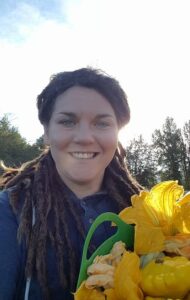
As a first generation farmer, it was the unbelievable taste of real food from healthy soil that got me hooked and dedicated to growing for myself, my family and others in our community. On August 22, 2021, my life partner and now husband Mike Vanzandwyk and I planned quite the wedding feast to share with our family and friends to celebrate our union after 13 years of learning to live, love and grow together. We had planned a simple full moon garden wedding with roast lamb and golden beet dinner and vinyl dance party. With forecasts of 25 mm of rain, we were blown away at our community of friends and family who came together the day before to convert an empty greenhouse on the property into the most magical sheltered wedding venue.
I am sharing this story today in hopes of speaking to the experience of being seen, trusting a diverse community of folks who largely did not know each other to communicate and pull their resources, effort and care together to create space for us to all enjoy the day. This sense of being held and celebrated by our community has deepened our roots, allowed us to source vitality and set the intention to seek out how we can show up and give back to our community who, through our raining wedding day, all felt the power of making connections and working towards a common goal. We are all in this life together and I have learned that the more we get together, the happier we will be.
In Solidarity,
Bess Vanzandwyk
Women’s President
National Farmers Union
Un message de Bess Vanzandwyk, présidente des femmes de l’UNF
En tant que fermière de première génération, ce fut le goût incroyable de la vraie nourriture provenant de sols sains qui m’a accroché et éventuellement pourquoi je me suis dédiée à produire pour moi-même, ma famille et les autres dans notre communauté. Le 22 août 2021, mon partenaire de vie et maintenant mon époux, Mike Vanzandwyk, et moi avons planifié tout un festin de mariage pour partager avec notre famille et nos amis, afin de célébrer notre union après 13 ans d’apprentissage à vivre, aimer et grandir ensemble. Nous avions planifié un simple mariage à la pleine lune dans le jardin, avec un diner à l’agneau rôti et des betteraves dorées, et une soirée de danse alimentée par disques vinyles. Puisque les prévisions étaient de 25 mm de pluie, nous avons été vraiment épatés par notre communauté d’amis et notre famille qui se sont rassemblés la journée d’avant pour convertir une serre vide sur la propriété en un lieu de mariage tout à fait magique et protégé.
Je partage cette anecdote aujourd’hui dans l’espoir de raconter l’expérience d’être vus, de faire confiance à une communauté de gens divers qui, en général, ne se connaissaient pas vraiment et qui ont communiqué pour combiner leurs ressources, leurs efforts et leur bienveillance afin de créer pour nous un espace afin que l’on puisse tous profiter de cette journée. Ce sentiment d’être autourés et célébrés par notre communauté a donc d’autant plus ancré nos racines, nous a permis de ressourcer notre vitalité et de consolider notre intention de chercher comment nous pouvons être présents et redonner à notre communauté où, grâce à notre jour de mariage pluvieux, tous et toutes ont ressenti le pouvoir qui découle des connexions et du travail pour un objectif commun. Nous sommes tous ensemble dans cette vie et j’ai appris que le plus on se rassemble, le plus nous serons heureux.
En solidarité,
Bess Vanzandwyk
Présidente des femmes
Union nationale des fermiers
A Message from Jessie MacInnis, NFU Youth Vice President
I hope the signs of fall are bringing with them abundant harvests for all. I know this season has been a particularly daunting one for many intersecting reasons which I do not have the space to elaborate upon here. L ike many of you, I am breathing a little easier knowing this farming season is about to wrap up. For me personally, this first season on a new farm brought with it challenges that I could not have foreseen. I never underestimate the humbling power of nature nor the brilliance and generosity of friends and neighbours.
ike many of you, I am breathing a little easier knowing this farming season is about to wrap up. For me personally, this first season on a new farm brought with it challenges that I could not have foreseen. I never underestimate the humbling power of nature nor the brilliance and generosity of friends and neighbours.
As I write this, the election has yet to take place. Regardless of who takes office on September 21st, my pragmatism makes me fearful of the outcome, but my optimism – particularly in the farming sector – keeps me hopeful. The NFU and Farmers for Climate Solutions in particular has had a strong voice in advocating for more robust climate policy for the agriculture sector, and this campaign will cease to back down regardless of the election outcome. In addition, I am hopeful about the perseverance and dedication of young and new farmers – something I know will only become stronger as we find new ways to share knowledge and ideas with one another.
Speaking of young farmers – the theme for the Paul Beingessner Award for Excellence in Writing this year is: “How can young farmers help shape the post-COVID agriculture systems towards food sovereignty?”. If you are under 30 and keen to put pen to paper, you could win $500 by entering. Check out the information on page 17 on how to apply.
Un message de Jessie MacInnis, vice-président des jeunesse de l’UNF
J’espère que les signes d’automne amènent avec eux des récoltes abondantes pour tout le monde. Je sais que cette saison a été particulièrement décourageante pour plusieurs raisons qui s’entrecoupent et pour lesquelles je n’ai pas l’espace ici pour élaborer. Comme plusieurs d’entres-vous, je respire un peu mieux, sachant que la présente saison agricole tire à sa fin. Pour moi, personnellement, cette première saison sur une nouvelle ferme comportait des défis que je ne pouvais pas prévoir. Je ne sous-estime jamais le pouvoir saisissant de la nature, ni la brillance et la générosité des amis et des voisins.
Alors que je rédige ceci, l’élection n’a pas encore eu lieu. Peu importe qui est élu le 21 septembre, mon pragmatisme me rend craintif des résultats, mais mon optimisme, surtout dans le secteur agricole, me donne espoir. L’UNF, ainsi que Fermiers pour la transition climatique, en particulier, ont revendiqué à haute voix une politique climatique plus robuste pour le secteur agricole et cette campagne ne va pas abdiquer, peu importent les résultats des élections. De plus, je suis encouragé par la persévérance et le dévouement des fermiers, jeunes et nouveaux, et je sais bien que cela va se renforcer à mesure que nous trouvons de nouvelles façons de partager entre nous nos connaissances et nos idées.
En parlant des jeunes fermiers, le thème du Prix Paul Beingessner pour l’excellence en écriture de cette année est : « Comment les jeunes fermiers peuvent-ils aider à façonner les systèmes agricoles post-COVID en matière de souveraineté alimentaire ?». Si vous êtes âgés de moins de 30 ans et que vous aimez couchez vos idées sur papier, vous pourriez gagner 500 $ en y participant. Consultez l’information à la page 17 sur comment participer.
—
**Translation supported by Heritage Canada**
Regional Reports
Region 1, District 2 – Province of New Brunswick
– by Suzanne Fournier, Executive Director
It has been a quiet summer in New Brunswick, increased rainfall amounts after two years of severe dryness has improved the growing season for many NB farms but has not been evenly distributed across the province. The NFU-NB continues to work with provincial counterparts on addressing agricultural weather forecast needs, with the loss of AgWeather Atlantic service in 2018. We prepared a survey for all NB farms to assess their weather forecast and data needs, which is still open to answer.
Our Communications Specialist, Gillian Cormier has been very active in strengthening communications and increasing our online presence. She has started an Instagram account (nfu.unf.nb) for the NFU-NB to bring attention to our work to a wider audience. Gillian has also begun project development to increase access to local food for marginalized and rural New Brunswickers that the NFU-NB has been interested in for over a year.
Our presentation to the Standing Committee on Climate Change and Environmental Stewardship in June went well and led to local media engagement. A summary of the presentation can be found in our summer newsletter The NB Family Farmer. We look forward to hearing Indigenous communities present in September and for the Committee’s decision.
NFU Store
The NFU is pleased to offer a 10% discount to all members in the NFU’s new on-line store! To shop for products, visit www.store.nfu.ca/
Region 3: Province of Ontario
– by Don Ciparis, Coordinator
The summer of 2021 has been one of many contrasts across the province. As spring crops were planted into generally ideal, even dry soil conditions, fortunes soon changed with considerable rains and constant overcast skies appearing from mid-June to late July in various areas of the south. Net result was crop flooding in low areas, nutrient losses in sidehills and frequent fungicide applications for grain, vegetable and specialty crops. Rains close to the wheat harvest resulted in much of the province’s crop being downgraded for quality. Areas not as impacted by rain are looking at possible record yields.
In Northwestern Ontario, heat and drought has been devastating to livestock and grain producers, reaching a point that calls were for assistance to producers. Ontario’s three general farm organizations, including the NFU-O, and commodity groups signed a communique to the federal government requesting help to those affected. The effort was successful in having up to 2 million dollars allocated from the province for producers affected. The NFU-O conveyed its gratitude to the provincial Agriculture Minister at a virtual meeting with her.
The threat of feral populations of wild boar and the harm possible to existing commercial pig herds has encouraged the province to invite stakeholders to a consultation on addressing the problem. Popular with game meat nights in some restaurants and private homes, wild pig production for domestic meat is a niche market that has operated safely by a number of NFU-O families. A response was provided by Provincial Council and we requested a meeting with the Minister at a member’s farm to illustrate to her that such production is safe.
The Province has indicated it intends to review the regulatory framework of Conservation Authorities (CA’s). Knowing that CA’s work closely with farmers and farm organizations and that the consultation addressed the role of CA’s in the face of “worsening impacts of climate change”, a response was critical and we provided one. It can be found at: https://nfuontario.ca/new/response-to-regulatory-proposals-phase-1-under-the-conservation-authorities-act-ero-019-2986/
The NFU-O submitted its thoughts to the PMRA on the proposed changes to MRL’s of glyphosate for desiccant use in certain crops. This round of consultations has resulted in a delay of a final decision by the PMRA.
A cabinet shuffle in late July brought a new Agriculture Minister, Hon. Lisa Thompson, who has considerable farm and agricultural background. With perseverance, I was able to meet with the Minister for a brief while to convey NFU-O concerns on the challenges faced by aspiring or new farmers, a local food production system, our long history of critically assessing FTA’s as well as the challenges presented by climate change.
Somewhat unique to Ontario is our system of county-regulated tree by-laws that prohibit the destruction of woodlots in order to preserve the forest cover that is vital in addressing the threat posed by climate change. A long-time opponent of this trend has been the Municipality of Chatham-Kent that announced a temporary by-law in order to consider implementing a permanent by-law. Responding to a request from our C-K Local to submit a response to the consultation by the county and personally being an immediate neighbour to them, dictated that the NFU-O would definitely submit a response. But continuing in our efforts to work with allies, we contacted The Ontario Woodlot Association and the Ecological Farmers Association of Ontario to determine what their interest would be in signing on to the NFU-O letter, written at the request of the NFU Chatham-Kent Local. Both saw value in a collaborative response to the consultation and we thank John and Brent. Our submission can be seen on our website here: https://nfuontario.ca/new/joint-response-to-chatham-kent-temporary-clear-cutting-by-law-72-2021/
Lastly, on a sad note, the NFU-O lost long-time member, local executive, Provincial Director and national delegate Tim Tabbert of Foresters Falls in July. Tim was an asset to the organization and an ambassador to the charm and culture of the Ottawa Valley. Please keep him, his wife Connie and family in your thoughts.
With that, we wish everyone the best of health and a very successful summer and fall harvest.
Don Ciparis,
NFU Region 3 Coordinator/NFU-O President.
Region 5: Province of Manitoba
NFU Manitoba: We are a dedicated organization of very interested and involved diverse farm people, pressing for better rural policy action for farmers since before 1969. Where we come from matters to where we are headed as we think about resilience in farming, considering this year’s farming challenges — drought, floods, forest fire smoke, etc.
Rain since mid-August has started replenishing soil moisture for the next crop and will restart pastures for a bit of fall grazing. We now need dry weather to keep harvest on track. The intense summer heat caused crops to wither, shortage of stock feed and reduced water supply. Crop Insurance and emergency drought and flood programs are needed recently and do help farmers.
The NFU continues to find the right balance between caring critically for the environment while we protect the economic interests of farmers. Across Canada, we are all anticipating funds to help farmers transition to lower input/lower emissions farming methods thanks to a recent Federal government announcement. This transitional funding from Ag & Ag-Food Canada (AAFC) will be critical to helping more of us make these important shifts in our production methods.
The funding announced for AAFC’s $200Million On-Farm Climate Action Fund came about in large part because of the advocacy of Farmers for Climate Solutions (FCS). The NFU is a founding member of FCS, which has grown to about 20 farm organizations across Canada (see the website: https://farmersforclimatesolutions.ca/). This dynamic and influential coalition has had a huge impact on the federal funding for climate transitions in agriculture. Thanks to this funding, farmers will be able to receive supports to move toward greater nutrient management, cover cropping and rotational grazing.
NFU in Manitoba has recently advocated for the MB Minister of Ag and Resources to support a new Ag Policy Framework Plan to target getting more farmers on the land. NFU MB and Manitoba Organic Alliance were able to speak with our Minister of Ag and Resources on this topic.
Look for an upcoming NFU Zoom meeting about landlinking to find and access farmland even as farmland prices increase. Other upcoming NFU events we are looking forward to include the resumption of NFUniversity and a dynamic National Convention in late November on the theme of Agriculture & The Common Good. Look for notices in your email or check our website nfu.ca for info.
We are thrilled that the NFU has clearance to send farmers & Indigenous People to the UN Climate Convention in Glasgow, Scotland this November! Stay tuned for updates from the super climate-smart NFU contingent and please help support their trip with your donation. Their voices will be well-informed, both from personal on-farm experience and from the NFU’s climate policy leadership. Call the office to donate.
Region 6: Province of Saskatchewan
– by Dixie Green, Coordinator

We finally got together, members and friends, for a potluck and visit on July 25th at Douglas Provincial Park. We then explored the park, including swimming in the clean lake, and exploring some trails. Some of us headed to Gardner Dam at the north end of the lake, learned more about Lake Diefenbaker, it’s development and use of the water reserve. My party circled around the Lake to Lucky Lake and took the ferry 1.5 km to Riverhurst, and stayed the night there. A very hot day but it was great to meet with members and to see the highlights of Lake Diefenbaker!
We continue to oppose the development of the $4B Lake Diefenbaker Irrigation project, following our policy outlined in our 2020 Resolution. The Sask Government held 2 open houses to promote the project. They are not soliciting feedback on the repercussions of this development. There needs to be a strong opposition to this mega project and our committee is looking for people who can help us educate about the negative consequences to all tax payers, as well as the environment. There is much work to do!
Now we are facing a grim harvest. Some farmers are not able to fulfill their conservative grain contracts and are finding they have to pay replacement costs on the shortfall. Contracts prove to be one-sided guarantees of supply and price for the grain companies. In contrast to this consequence for the short-fall of farmer’s delivery, the grain companies that fail to call for delivery by the specified date pay no penalty to the farmer.
Indeed yield is down in Saskatchewan, at least 20% of last year. Personally I harvested 8 bu/acre – down 75% of last year. I’ve sold my cows as feed is in short supply. Hay may be $180/ton! The markets are seeing a large sell off of cattle which is driving cattle prices down. Not a good year!
Betty Daniels reports that the NFU Farmland Policy Action Committee are creating a series of webinars on alternative land tenure models. All NFU members will be welcome to attend starting in October. Watch for notifications.
The executive committee have met monthly this year (Dixie Green, Rachelle Ternier, Al Bouchard, Betty Daniels, Lyle Orchard and Julie Maxwell). We have worked to recruit and welcome new members and address a few of the issues that are current and impacting us all.
In Solidarity,
Dixie Green, R6 Coordinator
Region 7: Province of Alberta
– by Doug Scott, Coordinator
To say that we are living in turbulent times would be an understatement. To many of us it feels like the accomplishments of the past several decades are being undermined by a disgruntled minority who have learned to manipulate social media. I never thought I would see the day when an election call would bring such vitriol to the surface. Intimidation, racial slurs and death threats are not things that Canadians who seek public office should be subjected to. We all have the right to express our political views but I find the tactics being used in this election to be deeply disturbing. It brings back memories of some of the unpleasant interactions that many NFU members in Alberta experienced in our campaign to save the Canadian Wheat Board. Stories of being “run out of town” were not just stories.
Harvest is underway across much of Alberta, primarily in the cereal grains. The canola crops are being swathed and are still several weeks away from harvest. Although the overall picture appears bleak there are areas in the province that did receive timely rains and are harvesting some relatively decent crops. In fact there are farmers in the Edmonton Calgary corridor that are reporting above average yields. I have spent the past week combining both winter wheat and CPS wheat. Although the plants are shorter than normal the fields have yielded in the 50-60 bushel range. At ten dollars per bushel this creates revenues in the 500-600 dollar range substantially better than an 80 bushel per acre crop at five dollars per bushel. Given the difficult growing conditions experienced in most of the grain growing regions around the world this year it is likely that supply issues will continue to support these prices. The hardest hit are the ranchers and cow calf operators who have seen their pastures turn brown and their hay fields yielding less than half of normal. Many early barley crops were silage for feed.
I have often considered crop insurance to be akin to going to Vegas. It is a gambling game and if the right boxes are ticked and the right choices are made it can turn a poor crop into a profitable one. A local farmer once told me that the most profitable crop he ever had was one of his poorest but he understood the intracacies of the crop insurance program and made the best of it. Consider this scenario.
The average canola yield on a farm is 40 bushels per acre. The farmer chooses an 80% coverage level which means that he is insured for 32 bushels per acre, the farmer also chooses the spot loss hail endorsement. The crop yields 25 bushels per acre. With canola trading at close to 20 dollars per bushel that creates revenues of 500 dollars per acre. Because the yield falls below the 32 bushel insured coverage AFSC makes up the difference. AFSC has raised the canola covered price to 16 dollars per bushel. That creates additional revenues of 112 dollars per acre. This puts revenues over 600 dollars per acre. Add to this the hail endorsement which is the wild card. Any amount of hail damage is difficult to assess and crop adjusters most often give farmers the benefit of the doubt. This can result in substantial payouts to farmers who guessed right. My point being that the crop insurance programs that are available to farmers are substantial and if used properly can play a huge role in financial stability on prairie farms.
The first job of the day is to fix the knife on the combine header that became a two piece knife late last night and figure out how the cab door became locked with no one in it and the motor running.
Take care of yourself and one another. My little granddaughter wears a T-shirt that says “Be Kind”, it’s that simple.
Region 8: Province of British Columbia
It’s been a trying summer for many farmers in BC. The fires and heat have destroyed many crops and livelihoods. Some of us have been luckier than others depending on our location. The town of Lytton is suing CP and CN rail for starting the fire that destroyed their town. As farmers I’m sure we can all appreciate the lack of response from our rail lines. I hope the lawsuit holds accountable the majority shareholders of each of the rail companies.
The province has waived the income requirement for farms again this year. This allows farms with lower income to maintain farm status so their tax burden doesn’t increase. Land prices in BC continue to soar as the pandemic seems to have caused increased farmland speculation. Most of the young farmers I’m in contact with have given up on ever owning farmland in BC. FCC caps new farm loans for land at $350,000. Which begs the question, “When was the last time you have seen a farm for that price in BC?”
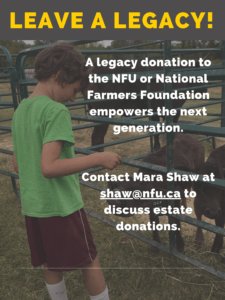
Sometimes disaster brings more good than bad for some farmers. Disaster south of the border increased the wholesale price and demand on many of the crops produced in southern BC. We’re seeing another year of this play out on grocery store shelves.
On our little farm, our crew has been tied up at the Fairy Creek protests. Some have been arrested, locked to trees, intimidated by the RCMP. It’s brought home questions of land solidarity and the effectiveness of protest. What does land solidarity mean when the ask is “land back?”
We are thankful some rain has started and are looking forward to the cooler weather in the fall.
The November COP26 UN Climate Conference in Scotland: An introduction
– by Darrin Qualman
In a nutshell: Important international climate talks will occur in November; NFU members and officials will attend; you can help support this work.
From October 31st to November 12th, government officials and others will gather in Glasgow, Scotland, for the 26th UN Climate Change “Conference of the Parties” (COP26). The aim is to advance action toward the goals set out in the Paris Agreement (agreed at COP21 in 2015) and the UN Framework Convention on Climate Change (UNFCCC). As a Paris Agreement signatory, Canada has committed to act to limit global warming to well below 2 degrees Celsius (compared to pre-industrial levels) and preferably to 1.5 degrees. Recently, Canada increased its emission-reduction commitment to a 40 to 45 percent decrease in greenhouse gas (GHG) emissions (relative to 2005 levels) by 2030. In December 2020, the government published a plan to achieve that reduction.
COP26 is an important conference for several reasons:
- Pandemic permitting, many heads of state will attend (which does not occur at every COP).
- On the release of last month’s 4,000-page IPCC report, the UN declared a “code red for humanity.” UN projections show the world on track to 3.2 degrees of warming. COP26 is critical to redirecting the world onto a safer path.
- In the 2015 Paris Agreement, countries agreed to update (and increase the ambition of) their emissions-reduction commitments every five years. 2020 marked the end of the first five-year cycle. Thus, countries are expected to update their 2030 commitments in the lead-up to COP26. The hope is that countries will bring forward new, ambitious 2030 emissions-reduction targets and put the planet on track to reach net zero by, or shortly after, mid century and retain the possibility of limiting warming to 1.5 degrees.
- We are entering the first Global Stocktake—a period of assessment regarding whether governments and economies are on track to reduce emissions quickly enough to stabilize the climate in line with Paris commitments. This first Stocktake takes place from 2021 to 2023, and the process will be repeated every 5 years.
- At COP26 in November, countries will try to finalize the remaining pieces of the Paris Agreement “Rulebook”—especially the contentious Article 6 that would enable a range of international trading arrangement for greenhouse gas offsets and credits. (The potential for deception, double-counting, and exploitation of peasant farmers is very high in any such trading schemes.)
- Key in Scotland will be whether developed nations can fulfill existing promises to developing (and often most-affected) nations: unmet commitments such as $100 billion in annual financial assistance to help fund adaptation and emission-reduction technologies. Also critical is the issue of “loss and damage”: acknowledgement and payments for the impacts of industrial nations’ long-term emissions on the most vulnerable and least culpable nations.
The NFU plans to send several members and officials to COP26 in Glasgow. The NFU contingent will attend and address civil society events; create and strengthen international linkages with allies; receive regular briefings and engage with Canadian government officials; link back to Canadian media; develop a deeper understanding of the international frameworks and negotiations that underpin emissions reduction and climate stabilization; and build NFU capacity to more effectively advance national and international policies to help farmers, reduce emissions, build resilience, and transform food systems.
To support NFU representatives and help the NFU cover their travel and accommodation costs, please visit the GoFundMe page we have set up: https://ca.gofundme.com/f/72yke-send-farmers-to-un-climate-convention-to-be-heard or contact the office at nfu@nfu.ca or 306-652-9465
—
URL LINKS:
ukcop26.org (https://bit.ly/3EfYKBa) (https://bit.ly/3tDVj2t) (https://bit.ly/3nAR86m) (https://bit.ly/395uA58) (https://bit.ly/2VEauvM) (https://bit.ly/3k8HXYE)
Reframing the Farm Labour Crisis in Ontario
A report by the National Farmers Union – Ontario
Executive Summary
Growing concerns over a “farm labour crisis” or “farm labour shortage” have not taken into account the unique labour conditions on small and mid-sized farms. There is a need to reframe the discussion on the farm labour crisis to better understand how labour shortages are felt and understood within smaller operations compared with large agribusinesses. The voices of agriculturalists committed to creating local, just, and sustainable food systems are too often drowned out by corporate lobbyists.
In April 2020, the NFU-O embarked on a Farm Labour Project to study agricultural labour issues on small and mid-sized farms. The following report and recommendations are based on a mixed methods study that included a survey of 772 farm operators and workers, stakeholder consultations, informal interviews, online group discussions, and a literature review.
The study found that small to mid-sized farms are robust agricultural job creators. In fact, farms under 70 acres were more likely to employ Ontarians than their larger counterparts. Temporary Foreign Workers make up only 8.5% of the workforce on small and mid-sized farms compared to 30% across the entire sector. Many of the farms surveyed provide extensive farm training and are the knowledge incubators for the next generation of farmers. There is plenty of work on these farms, and plenty of people are attracted to the work and the rural lifestyle.
There is, however, a shortage of living-wage agricultural jobs which has led to a scarcity of skilled and experienced workers.
The reasons for a shortage of living-wage agricultural jobs are complicated. A farm income crisis has left small and mid-sized producers with little take-home income to pay themselves, let alone their essential workforce. After thirty years of free trade agreements, a capitalist global food system has decreased the market value of many agricultural commodities and ultimately set the wage floor to the lowest paid farm workers in the world. Partial exemptions under Ontario labour law have excluded agricultural workers from minimum wage laws and other key labour protections. Under these conditions, it is no wonder why many Ontarians are reluctant to perform highly skilled, physically demanding, lowpaid agricultural work.
Without living wages/incomes we are unlikely to attract enough Ontarians willing to acquire the skills and dedicate their lives to agricultural production.
If we want to open the doors to living-wage jobs and increase farm incomes in Canadian agriculture without tariffs or other protective market mechanisms, then even more government support is needed. Farm labour grants and wage subsidies, improved access to EI, and ideally a Basic Income are urgently required to ensure farm workers and operators are receiving a decent annual income regardless of their hourly wage, farm earnings, or the length of their season.
Common values and a positive team culture on Ontario’s small and mid-sized farms have continued to attract aspiring farmers. But they are unlikely to stay or become the next generation of farm operators unless we deal with the financial precarity of those who grow our food.
Recommendations
The recommendations arising from the NFU-O Farm Labour Project are clustered in two sections. The
first, “Building Farm Employer and Farm Worker Capacity,” suggests measures that farmers, farm organizations, community groups, eaters, and other stakeholders can take to support and grow Ontario’s agricultural workforce.
The second, “Municipal, Provincial, and/or Federal Support and Legislation,” provides key policy recommendations directed at elected officials and all levels of government. The implementation of these policies will support the essential work of Ontario’s small and mid-sized farms.
To read the full report, visit www.nfu.ca/publications
Agricultural Migrant Worker FAQ: Part Three
By the NFU Migrant Workers Solidarity Working Group
In July 2021, the federal government proposed 14 regulatory amendments to the Immigration and Refugee Protection Regulations for Temporary Foreign Workers (TFWs).
Q. Why did the federal government propose these changes and what are they?
A. The proposed regulatory standards would affect approximately 90,000 migrant farm workers who arrive annually in Canada. The need to overhaul TFW programs is real: systemic inequalities have made agricultural TFWs among the most vulnerable worker populations in the country. This became especially apparent during the pandemic; by some tallies migrant workers were 10 times more likely to contract COVID-19 than the overall population.
The vulnerability and exploitation of migrant farm workers in our food systems is not new. Between 2016 and 2020, Service Canada received over 300 tips of allegations of abuse and mistreatment of TFWs. Numerous gaps in employer compliance and the ability to enforce and protect TFWs were identified prior to and during the pandemic. Key among these “gaps” are language barriers, access to information on rights and protections, and the fear of employer reprisal for speaking out.
Key proposed regulatory amendments would:
- Require employers to provide written information on TFW rights in English or French.
- Require employers to enter into negotiated written employment agreements with details outlining wages and working conditions.
- Amend the definition of “abuse” to include “reprisal” against TFWs, especially those who speak out about mistreatment and substandard working conditions.
- Prohibit employers for charging TFWs to recover fees involved in their recruitment or in employer compliance.
- Require employers to provide access to healthcare services including paying for private health insurance to cover emergency medical care fees.
- Suspend employer TFW applications if there is reason to suspect employer non-compliance.
Q. Will these regulatory changes provide adequate protections for TFWs?
A. The NFU’s Migrant Workers Solidarity Working Group believes these changes are a step in the right direction. Informing migrant farm workers of their rights, providing negotiated employment agreements, stopping employer reprisals and “fee” recoveries, ensuring medical health access, and suspending recalcitrant employers from using the TFW programs, are important measures. However, the proposed amendments are missing key reforms. These include the failure to:
- Address language barriers for migrant farmworkers whose first language is neither English nor French.
- Correct the power imbalance. While having signed negotiated employment agreements would be a positive development, there is no real mechanism for TFWs to negotiate as equal partners and there is no means to appeal and/or resolve breaks in their contracts.
- Offer real mechanisms to protect from reprisal. Even under these amendments, if a TFW speaks up an employer can still have them deported and blacklist them as a troublemaker. There is no proposed tribunal for TFWs to appeal an employer’s unilateral decision to send them home.
- End closed work permits. With migrant farm workers tied to a single employer there is no means for them to leave unsafe working conditions and continue to work in the country.
- Offer pathways to citizenship and/or status for all. As an essential workforce, and comprising upwards to one-third of all farm workers in the country, TFWs deserve an avenue for themselves and their family to become permanent residents of Canada.
Q. Bringing it home: Why should it matter to me?
A. Providing greater protections to migrant farm workers improves the working conditions of all farmers and agricultural workers.
Following the federal election in September, we will need to put pressure on our elected officials to support those who grow our food. Knowing about the proposed regulatory changes will help us to collectively speak out to ensure greater rights and protections for migrant farm workers.
Look for more Migrant Farm Worker FAQs in upcoming UFQs!
—
URL Links:
https://gazette.gc.ca/rp-pr/p1/2021/2021-07-10/html/reg2-eng.html
https://healthydebate.ca/2021/01/topic/healthcare-migrant-workers/
UNFSS and the People’s Counter Mobilization
By Nettie Wiebe, La Via Campesina
This summer National Farmers Union joined thousands of allies from around the world in protesting the corporate capture of food systems. This massive, worldwide Peoples’ Counter Mobilization was provoked by the United Nations Food Systems Pre-Summit in Rome, July 26-28, 2021. In contrast to the capital intensive, technology driven “solutions” driving the Pre-Summit agenda, we highlighted the value of small- scale, family farming, food justice, ecological care and food sovereignty. (See the NFU video and other contributions at https://www.foodsystems4people.org/resources-2/#sec-13a5 )
Spearheaded by the Civil Society and Indigenous Peoples Mechanism (CSM) related to the United Nations Committee on World Food Security (CFS), the Peoples Counter Mobilization actually succeeded in mobilizing around the world and across multiple sectors against the corporate capture of food and for food sovereignty. We in the NFU were among some 9,000 people who participated in counter-mobilization activities. As the CSM noted, “About 20,000 people participated in the official Pre-Summit. This means that, with a tiny fraction of the material and symbolic resources that the Pre-Summit had at its disposal, we managed to mobilize almost half of the official audience against it.”
The UNFSS Pre-Summit was the culmination of nearly two years of intense “multi-stakeholder” activities involving corporations, UN agencies, governments, scientists and other “stakeholders”. The entire process has consumed copious amounts of time, energy, money and other resources. All this while a global pandemic is exposing inhumane health and economic inequalities and there is growing hunger and food insecurity for millions. [State of the Food Security and Nutrition in the World (SOFI 2021) http://www.fao.org/publications/sofi/2021/en/]
Yet the UNFSS Pre-Summit failed to focus on a global Covid policy response to this tragedy. Instead, the focus was on technological “solutions” including more sophisticated data collection and usage, more integrated global markets, intensification of production, more financial investment (corporate concentration) and strategies to integrate women and youth into this “transformed” food system.
The Summit organizers are now encouraging stakeholders to form “coalitions of action” to implement “solutions”. Governments are encouraged to develop “national pathways” with stakeholder coalitions, many of which will inevitably be dominated by those who can afford to fund them. This leaves countries that have been hit hard by Covid vulnerable to entering coalitions with investors and philanthro-capitalists, such as the Gates Foundation, to carve out “national pathways” that are profitable for their coalition partners.
Despite using up much of the oxygen in international food policy discourse, the Pre-Summit did not deal with questions of accountability, conflicts of interest or transparency. Nor were the threats to democracy and multilateralism and the absence of human rights grounding addressed. In a frank resignation letter (August 25/21), Dr. Kristy Buckley, Chair of the UNFSS Governance Action Area, notes that a “Means of Implementation” coalition has taken over which “includes two out of four Levers of Change while explicitly adding technology and data to the exclusion of human rights and gender…. By only viewing the means of implementation through the lens of innovation, finance, technology and data, with no regard to human rights, gender, and Indigenous Peoples, the Means of Implementation coalition entrenches existing narratives that transformation is the purview of innovation and finance”.
The official UNFSS, September 23, 2021, a day of diplomatic statements from governments, it is forecast to be both vacuous and boring.
But in the aftermath of the UNFSS, the NFU will need to continue to work as part of the Via Campesina to struggle for food, health, environmental and climate justice – while we also celebrate the 25th anniversary of Food Sovereignty launch.
Diversity in Agriculture
By Cheyenne Sundance, Black, Indigenous & People of Colour (BIPOC) Working Group, NFU-Ontario board member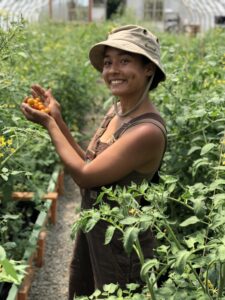
Diversity within no-till, organic and ecological growing often looks like interplanting, cover cropping and ensuring you are planting a diversity of crops on the land. Diversity is a strength as the earth shows us this, through her continual wisdom and teachings. Many of us, myself included, know that human-scale farming and local community-focused agriculture can lead us on a path to mitigate the effects of the climate crisis, maintaining and increasing local biodiversity, build and maintain rural community wealth, increasing the number of green jobs and ultimately creating community food sovereignty among many other points. To have those points continue to advance into fruition, we need to ensure everyone feels like they can become a farmer in the first place. Right after high school, I began my journey learning about farming by going to Cuba and then came up north through the States to the west coast of Canada. Growing up I didn’t have a lot of access to green space so throughout my 3-year journey when I visited many farms, I saw a whole new world I didn’t think was possible. As an aspiring farmer then, I wanted to see myself, as a Black woman, reflected within agriculture and I never did once see that in a leadership role. Representation, through leadership and our voices, is something that is crucial for small-scale agriculture to make deeper waves within the mainstream. The National Farmers Union has seen space for representation being made since the creation of the Youth and Women’s Advisory Committee, which was created to have a space for these minority groups in agriculture to have a space to talk about their experiences so more youth and women can see agriculture as a viable career choice.
Running my farm has been a long and often difficult journey. On top of the hardships many of us face within farming and policy, I’m also dealing with the barriers that come up as a Black woman entering a field with very little representation of women who look like me and who are doing this as a career. Many farmers of colour are aware that discrimination and prejudice can still exist within agriculture as it can exist in any other career. Having a space to talk about our experiences, brainstorm on ways to encourage more Black, Indigenous & People of Colour (BIPOC) farmers to feel welcome and to create relevant workshops for us which address our barriers (such as colonialism and systemic racism) are only some of the reasons to formally establish a BIPOC Advisory Committee.
Similar reasons are why the Youth and Women’s Advisory Committees were created in 1969, to encourage leadership and a natural access point to the rest of the work of the NFU. BIPOC, Youth and Women groups are minority groups in farming and because of that having space for us to convene and meet in a recognized way will allow for more equity and diversity within agriculture.
I can see it every day, in my emails or in person, how many young farmers of colour feel emboldened to start a career in agriculture. Becoming a farmer can be a really big feat and support is necessary on this beautiful, nourishing and crucial career. So creating a BIPOC Caucus would be a great expression of support from the NFU as BIPOC farmers become more engaged in agricultural policy and organizing work. I would like to pass an amendment to create a BIPOC Advisory Committee at the next convention. I believe every single person who wants to become a farmer should have the opportunity to do so, which is why I do believe the supportive space of a BIPOC Advisory Committee can tend to and grow the next generation of farmers of colour. The more farmers we have in Canada, the stronger this movement can be for us and the land we call home.
Beingessner Award for Excellence in Writing
Working with the family of Paul Beingessner, the NFU has established an annual literary prize in honour of Paul and his contribution to rural and agricultural journalism. Paul Beingessner was a farmer, an activist, and a writer who defended Canada’s family farms until his tragic death in a farm accident in the spring of 2009. His widely-read and respected weekly columns brought a fresh and progressive perspective to rural and farm issues. Young writers are encouraged to submit their work to the Paul Beingessner Award for Excellence in Writing.
Award Criteria and Details:
There will be two age categories – 15 to 21 years old, and 22 to 30 years old. One award in the amount of $500 will be awarded each age category for a NON-FICTION OPEN LETTER 500-1000 words in length.
Applicants can only win once per age category.
Deadline for entries is November 1, 2021.
This year’s THEME: How can young farmers help shape the post-covid agriculture system towards food sovereignty?
Send entries to the National Farmers Union:
By email: nfu@nfu.ca or
By mail: National Farmers Union, 2717 Wentz Ave., Saskatoon, SK S7K 4B6
The winners will be announced at the NFU Convention in November 2021. All or some entries may be published by the NFU. We will confirm that we received your email submission within a week. If you do not get a confirmation email, please resend your entry or phone the office at (306) 652-9465.
Do you want to get more Involved?
The NFU’s priorities are driven by members, so get involved! Here’s a list of currently active committees. If you would like to tackle an issue of concern to you, we are happy to help get that started. Contact us in the office to discuss how best to tackle your issue of concern.
To get involved, email the office at nfu@nfu.ca and let us know which committee you are interested in, and we will add you to their contact list.
Current Active Committees are working on:
- Seed
- Livestock
- Grain marketing and transportation
- Climate Change
- Trade
- Supply Management
- Farmland ownership
- Mental Health
- Indigenous Solidarity
- Migrant Worker Solidarity
- International Programs
- La Via Campesina
- BIPOC-led issues
- Regional issues
NFUniversity 2021-22 starts Oct 14
Mark your calendars for the upcoming NFUniversity fall and winter session!
The first month’s classes will be on October 14 and 28 at noon Pacific Time.
NFUniversity features some of North America’s top thinkers on critical agriculture issues. The classes are free of charge, held by Zoom the second and fourth Thursdays of October, January, February, March and April. NFUniversity topics focus on climate-change on second Thursdays and other NFU priority topics on the fourth Thursdays of each month.
NFUniversity kicks off on October 14th with A look ahead to the COP26 Climate Conference in Scotland: understanding the negotiations and issues.
As topics and speakers are confirmed, registration information will be posted on the NFU website and publicized via email and our social media channels. Each class will feature one or two speakers — experts, researchers, farmers, and others — and will include a question-and-answer period. French interpretation will be provided if requested in advance. Following the formal session, everyone is invited to stay in Zoom-space for small group conversations to carry on the discussion with other attendees, similar to going for coffee after class.
To watch last year’s NFUniversity presentations, go to https://www.nfu.ca/nfuniversity/ and click on the “Past Classes” link or check out the NFUniversity Playlist on https://www.youtube.com/c/NationalFarmersUnionCanada
L’Université NF pour 2021-22 commence le 14 octobre
Inscrivez ceci à votre calendrier pour la prochaine session de l’automne et de l’hiver de l’Université nationale des fermiers !
Les classes du premier mois auront lieu les 14 et 28 octobre, à midi, heure du Pacifique.
L’Université NF met en vedette certains des meilleurs cerveaux de l’Amérique du Nord entourant les enjeux critiques en matière d’agriculture. Les classes sont gratuites et via la plateforme Zoom les deuxièmes et quatrièmes jeudis des mois d’octobre, janvier, février, mars et avril. Les sujets de l’Université NF mettent l’accent sur les changements climatiques les deuxièmes jeudis et sur d’autres enjeux prioritaires pour l’UNF les quatrièmes jeudis de chaque mois.
Le lancement de l’Université NF a lieu le 14 octobre en jetant un coup d’œil sur la Conférence COP26 sur le climat en Écosse : comprendre les négociations et les enjeux.
À mesure que les sujets et les conférenciers seront confirmés, l’information pour s’y inscrire sera affichée sur le site web de l’UNF et annoncée par courriel et sur nos canaux de médias sociaux. Chaque classe comportera un ou deux conférenciers ; des experts, des chercheurs, des fermiers et autres, y compris une période de questions. L’interprétation sera offerte en français si elle est requise à l’avance. Juste après la session formelle, tout le monde est invité à demeurer dans l’espace Zoom pour continuer des conversations en petits groupes et les discussions avec d’autres participants, un peu comme aller prendre un café après la classe.
Afin de visionner les présentations de l’Université NB de l’an passé, allez au https://www.nfu.ca/nfuniversity/ et cliquez sur le lien « Past Classes » ou consultez la Liste de lecture de l’Université NB au https://www.youtube.com/c/NationalFarmersUnionCanada.
NFU 52nd Annual Convention November 25 to 27, 2021 – Online
Because the NFU has your health as a top priority, we will be hosting the NFU National Convention virtually this year using Zoom/phone. You will be able to attend from the comfort of your home by phone or computer.
Convention will run Thursday, November 25 to Saturday, November 27, beginning each day at:
9:00 AM BC 10 AM AB, YT & NWT 11 AM SK & MB
12 Noon QC & ON 1 PM PE, NS &NB 1:30 PM NFLD
More details regarding registration and speakers will be available soon, so keep checking our website at www.nfu.ca or call the National Office at (306) 652-9465.
52e Convention annuelle de l’UNF 25 – 27 novembre, 2021 – En ligne
Puisque votre santé est une priorité absolue pour l’UNF, nous organisons la Convention annuelle de l’UNF en mode virtuel via Zoom/téléphone. Vous pourrez y participer dans le confort de votre foyer par téléphone ou ordinateur.
La Convention aura lieu du jeudi 25 novembre jusqu’au samedi 27 novembre, commençant à chaque jour à :
9h00 C.-B. 10h00 AB, Yn & T.N.-O. 11h00 SK & MB
12h00 QC & ON 13h00 I.-P.-É., N.-É. & N.-B. 13h30 T.-N.-L.
Plus de détails seront disponibles d’ici peu sur l’inscription et les conférenciers, alors continuez à vérifier notre site web au www.nfu.ca ou téléphonez le bureau national au (306) 652-9465.
Send NFU Farmers and Indigenous Members to the UN Climate Convention in Glasgow this Fall
The voices of NFU farmers and Indigenous People need to be heard when world leaders assemble in Glasgow, Scotland this November to discuss climate agreements that will profoundly affect the future of all living beings on this precious earth, our home.
The NFU has led on climate solutions for years and intends to bring that leadership to Glasgow if we can fund the travel. Let’s get real knowledge in front of the decision-makers in Glasgow this year. You can donate at www.gofund.me/8c4b6b59
NFU farmers and Indigenous People are seeing the effects of the climate crisis on our farms and lands and know the policy and science needed to address the climate crisis in agriculture. They will work doggedly to convey the severity of the climate crisis and real climate solutions to media, government and civil society movements.
Here’s a beautiful video our contingent has made. Please give what you can and share widely so the voices of those with experience and knowledge are heard: https://www.youtube.com/watch?v=kvoEVLJ-aJY&t=9s

Obituaries
In memory of Wout Van Gaal, 1926 – 2021
Wautherus Johannes (Wout) Van Gaal passed away peacefully at the Victoria Glen Manor in Perth-Andover, New Brunswick on Tuesday, August 10, 2021. Born December 28, 1926 in Schaijk, Nord-Brabant in Holland to Siebert Van Gaal and Berdina Van Kessel.
He was predeceased by his wife Antonia (Tony) Benkers (2010) and son Anthony (1982). He is survived his children Betsy (David) Coleman of Fredericton, Theo (Lise) of Fredericton, Clymena (Robert) Brennan of Florenceville, Bernie (Brenda) of Fort Augustus, PEI, Louis (Carmen) of Morrell Siding, Mary (Gary Hughes) of Hanwell, and Joe (Carolyn) Grand Falls, eighteen grandchildren and eleven great-grandchildren who will miss their “Opa”.
Wout and Tony sailed to Canada in 1951 and began married life as farm labourers. They settled into the community of the Lower Portage below Grand Falls and over the years built up a thriving farm of their own. Their early years in Canada were hard ones, and they gratefully remembered the support they received from the community.
As a man of deep faith and a lifetime farmer, the Saint Patrick’s Church community was important to him and he could be seen driving tractors well into his eighties. As the farm grew, Wout made a point of supporting members of his community whenever he saw the need. A visionary with insight into the politics of the times – and deeply concerned over the plight of Canadian family farms — he became involved with the National Farmers Union and assumed leadership roles at both the regional and national level through the 1970s and 1980s.
In memory of Tim Tabbert, 1959 – 2021
Timothy Andrew Tabbert died at Renfrew Victoria Hospital, Renfrew, Ontario on Tuesday, July 6, 2021 at the age of 62 with his family at his side. Tim is the beloved husband of Connie (White) of Foresters Falls. Loving father of Christopher (Amy), Amanda (Alain Letourneau) and Shaun; and grandpa to Henry and Veronica.
Tim was a proud farmer his whole life, including his business life, as he spread liquid manure for the farming community since 1982, as well as doing custom field work. Tim loved to work on farm tractors and implements and visiting family and friends and making new friends. A goodbye with Tim could take more than just a few minutes. Tim loved to sing and rarely missed a karaoke evening at the Cobden Legion, Branch 550.
From The Eganville Leader, July 14, 2021: Tim and Connie “were both deeply involved in the National Farmers Union (NFU) where Tim served in executive positions as director, vice president and president of the local branch as well as regional director and was active at provincial and national conventions. He loved going to protests in Ottawa with his manure truck or one of his tractors … One time he filled the manure spreader with water and close to Parliament Hill decided to spread the water. Unbeknownst to him, a police officer was right behind him and it appears Mr. Tabbert did not do a complete job of cleaning out the manure spreader before filling it with water, so the officer was showered with a smelly liquid. The officer started writing up every ticket he could think of, only to be told by his commanding officer no tickets were to be given to protestors … His local NFU colleagues recalled a sharp, quick-witted man who was a loyal member and passionate about farming issues.”
French translation of portions of the UFQ provided in part by the Government of Canada
